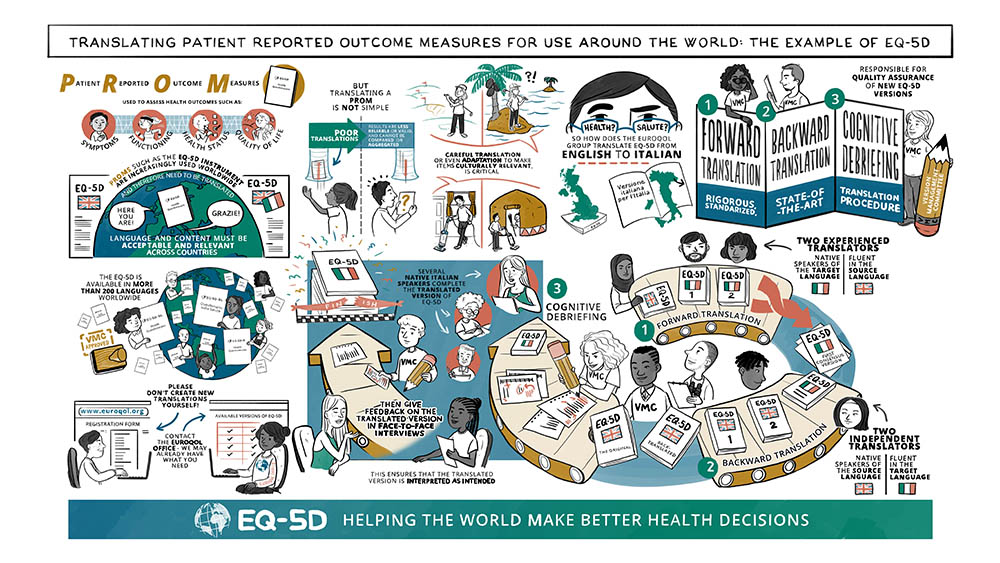Translation process
All translations/adaptations of EQ-5D are produced using a standardized translation protocol that conforms to internationally recognized guidelines. These guidelines aim to ensure equivalence to the English ‘source’ version and involve a forward/backward translation process and cognitive debriefing. No translation can receive official endorsement from the EuroQol Research Foundation, unless it has been performed in strict adherence according to the EuroQol Research Foundation’s translation guidelines. The agencies we work with are compliant with our requirements.
Please remember that copyright of all translations remains with the Foundation.
A new whiteboard animation ‘Translating patient reported outcome measures for use around the world: the example of EQ-5D’ , providing a step-by-step overview of how to translate a PROM by showing how EuroQol undertakes the process for EQ-5D is available on YouTube in the languages English, Spanish, Chinese and Japanese. The static ‘big picture’ of the animation can be viewed below.

Translation policy
New translation requests can be submitted via our registration form.
Please be advised that only translations of official languages of countries will be initiated by the Version Management Committee (VMC). At the discretion of the VMC, exceptions may be considered if the language is widely used or if the language is of scientific interest.
The use of non-official languages in a country is only allowed following written permission from the EuroQol Office. It is permitted to select any available non-official language version for use in a country. For example, for the use of an English version in Belgium, it is allowed to use any available English version (English (USA), English (UK), English (India), etc.). However, for the most accurate results, the language version must be understood well by the respondent. Therefore, we advise to select the language version based on the background of the respondent; the country the respondent is originally from or, if such a version does not exist, we advise to use a language from a neighbouring country. Please find all available language versions on our website.
Please feel free to submit any translation requests via our registration form. Note that translation projects are complex, can include many dependencies and require substantial resources. As such, translation requests encompassing more than 20 language versions (including source dependencies) are assessed as large-scale projects. In cases where a significant number of versions are required (20+), we will divide the language list into multiple consecutive projects.
Translation costs
In principle, the translation costs are invoiced to the requester of the new language version. The translation costs include the fee of the translation agency and an administrative surcharge starting from the 1st of May 2024. Once we receive a translation request, the EuroQol Office will assess its feasibility and provide the requester with a quote and an estimated timeline for the project. With this information, the requester can decide if they would like to continue with the translation request.
In exceptional cases, at the discretion of the EuroQol Research Foundation, non-commercial users will be offered a waiver for (part of) the translation costs. Please contact the EuroQol Office for more information.
Last update: Sep 9, 2024